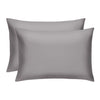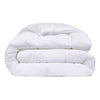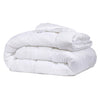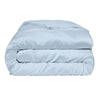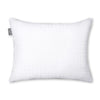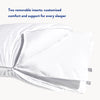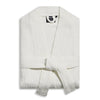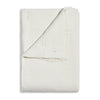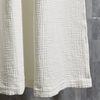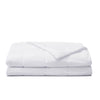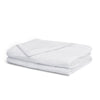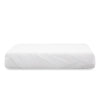
There's nothing quite like the feeling of hopping out of your shower all warm and clean, and being greeted by your soft, fluffy, cozy towel.
It really is the only thing that makes hopping out into the cold air worth it. Wrapping up in a soft towel is especially comforting on cold fall or winter days--you know, when the windows are all fogged up and the tree branches are empty. These moments are the little joys in life that tend to get overlooked. If taking a warm pie out of the oven could have a feeling, this is what it would be.
Even though we know them for their softness, towels actually have a pretty tough life. With the amount of friction, harsh chemicals, and other mysterious goopy products they deal with, it's not surprising that towels eventually begin to lose the plush-like properties that made us fall in love with them in the first place. Even the highest-quality towels from the best bath companies need some TLC every now and again to help bring them back to life.
Is your towel looking or feeling like it needs a little pick me up? It very well may be - and we're here to help. Here's how towels can be made soft again.
Start off strong
And by starting off strong, we also mean starting out soft. While towels inevitably lose their softness, with the proper care routine, you can rejuvenate your bathroom fabrics and keep them luscious for longer.
Maintaining softness begins with starting with the best towel possible right off the bat.
WHEN TOWEL SHOPPING, LOOK FOR TOWELS THAT:
- Are dense
- Are made up of high-quality cotton
These two pointers actually go hand in hand. Higher grade cotton is naturally denser, meaning it will be thicker and better able to absorb more water two very important towel qualities, if you ask us.
When choosing between towels, prioritize the heavier options to ensure you're maximizing the absorbency potential. A denser towel is also likely to feel more plush and cushiony - all the better for hugging you after your shower. It's sort of like we're aiming for properties similar to that of a weighted blanket.
Have you ever been a guest in someone else's home and had to use an old, paper-thin towel? Very unsatisfying. Starting out with a high-quality towel will give your towel a longer and happier shelf life.
When It’s Time To Towel Shop
Now that you know what to look for when towel shopping, it’s important to know when to call it quits on your current linens. While there are many ways to prevent rough towels and rejuvenate tired fabric, sometimes a new set of towels is necessary.
Invest in Antibacterial Towels
The main cause of rough towels is washing too frequently. Antibacterial, silver-infused towels clean themselves, resulting in 3x less laundry, maximum absorbency, optimal softness, and 99.9% fewer germs and bacteria.
Even if your old towels have seen their better days, chances are, with a bit of tenderness, love, and care, they’ll be back to their original softness with a wash or two. When the proper wash routine is implemented, high-quality towels will likely last longer than expected.
Why did my towel lose its softness?
The main culprit for towels losing their magical softness is residue from detergents and body oils that build up within the fabric. This buildup of leftover products will cause stiffness and a rough, crackly feeling. These remnants from products also diminish your towel's ability to absorb moisture. So, what can we do about it?
Prevention and Proper Care
Maybe your towel isn't a complete lost cause yet, or maybe you just got a new towel (yay, you!). Here are some things to keep in mind that can help preserve its softness!
Cut back on the amount of detergent you use.
A buildup of excess laundry detergent is the main offender for towels losing their softness
Many people use the recommended amount, or more than that, because it isn't too crazy to think that more soap more clean. Think again.
Err on the lighter side of the suggested amount of detergent. Your laundry machine will have an easier time rinsing it all out, meaning your towels won't end up carrying around any excess. No excess detergent no residue that can harden and stiffen up your towel.
Ditch Your Dryer Sheets
Dryer sheets are another product that’s supposed to promote softness and, instead, can damage the integrity of your fabrics.
Dryer sheets may make your towels smell delightful and feel soft to the touch (for the first few washes), but that feeling likely won’t last. Dryer sheets leave a film inside the machine and on the fabric, causing a decline in quality and absorption abilities.
While the refreshing scent can be tempting, we suggest skipping this unnecessary step for the sake of your towels!
DO YOU HAVE A HARD WATER SYSTEM?
"Hard water" is water that is dense in minerals, specifically high amounts of calcium and magnesium. Hard water is created by deposits of limestone, chalk, or gypsum.
Hard water makes up about 85% of America's water, so there's a high probability that this is the type of water that is in your home's system.
When water is especially high in minerals, it will appear slightly murky. Definitely not like the crystal-clear image we think of when we imagine a fresh, crisp glass of water.
USE THE RIGHT CLEANING SOLUTION.
Use a liquid detergent rather than a powered one. Powdered detergents attach easily to the minerals in the water, making the detergent less available to clean the actual laundry (your towels).
Add ½ cup of Borax to help soften the water in the load. The Borax will counteract the calcium that absorbs detergent.
Mind Your Pour
While a heavy pour may seem beneficial to your bath towels, that’s often not the case. In the same way that your choice of detergent can affect your towel's lifespan, so can the amount you use. Too much laundry detergent can cause something called detergent buildup.
Too much detergent affects the wash cycle, leaving a detergent residue (or coating) on the fabric. When your towels fall victim to detergent buildup, a loss in softness and fluff is soon to follow.
WASH TOWELS, AND ONLY TOWELS, TOGETHER.
When it comes to your bedding, duvets, comforters, and towels, they’re best kept separate. By washing similar items together, it ensures that they all wash and dry evenly.
Keeping towels separate from the rest of your laundry means that your towels won't be rubbing up against rougher items, like jeans. Less roughhousing during a rinse cycle means softer towels for longer.
Dry Your Towels Properly
Getting your towels perfectly dry is tricky. If they aren’t dried enough, mildew and mold can attack the moisture in the fabric, but if over-dried, the fibers can become damaged. Neither is ideal, which is why we suggest air drying when you can.
If you have the time, we suggest line-drying your towels from time to time. While dryers are ultra-convenient, the constant high heat and friction can damage your towels.
DON'T OVERLOAD EACH WASH.
Not only is a full-to-the-top load strenuous on your machine, but it makes it difficult for your washer to do a proper job of rinsing out all the soap and any other products that you may use.
Remember that excess product is the main culprit for towels building up residue and becoming stiff and crusty. Lightening the load may be the easiest way to help prevent towels from losing their softness.
Keep Your Water Temperature Low
Water temperature has a great deal to do with your towel's lifespan and how well your washer can get cleaned.
You may think the hotter, the better, but it's actually the contrary. Once the water reaches 75 degrees Fahrenheit or higher, it affects the detergent's cleaning ability. Not to mention, hot water can damage fabric, causing shrinkage. In almost every case, opt for cold water when washing clothes (especially towels).
AVOID USING LIQUID FABRIC SOFTENER.
Wait, what? This may sound counter-intuitive, but hear us out.
Super plush, super soft towel
Like dryer sheets, liquid fabric softeners contain oils and other additives that can create a coating over the fabric of your towels. This filmy coating may also make you feel like washing the towels more often - your towel will become worn-down more quickly.
An alternative to fabric softeners? Vinegar. Use one cup of vinegar instead of detergent in a wash load every six weeks. Vinegar will act to reverse any silicone-y coating that your towels may have built up. Vinegar will also help bring back any softness that has already been lost and can even help recover some of our towel absorbency potential.
We definitely don't give household vinegar the appreciation it deserves. Seriously, what an underdog.
But, back to business. Make sure to take these steps to make sure your new or current towels stay soft for as long as possible. But what if your towel is already stiff, crusty, and rather tree bark-like? We have solutions for that too.
How to make towels soft again
ADD BAKING SODA
Add ½ cup of baking soda along with your regular wash load to help bring towels back to life.
On top of baking soda softening properties, it also helps eliminate odors - yay!
(Ok, baking soda needs some more appreciation too.)
Brush It Out
You read that right; brushing your towels may help them regain that once plush, luscious texture you knew and loved.
The idea is that brushing out your once old, rough towels will remove the dried detergent while separating the threads, resulting in a towel that looks and feels brand-new. After implementing this hack, you’ll see your towel is noticeably fluffier and much more enjoyable post-shower.
USE A TENNIS BALL OR DRYER BALL
Adding a tennis or dryer ball into the dryer will help prevent the bumps and lumps that tend to develop throughout the cycle.
By softening out these bumps while the dryer is still going, it's kind of like straightening hair, except, you're straightening your towel.
Use Bamboo Dryer Balls
Bamboo dryer balls work similarly to tennis or dryer balls; they’re a vegan-friendly, natural alternative. Tennis balls (and certain dryer balls) can often leave an odd scent on your laundry.
Bamboo dryer balls, on the other hand, are ultimately a natural alternative to fabric softeners. They may be worth a try if dryer balls and tennis balls aren’t doing the trick for you.
Try All-Natural Fabric Softener Alternatives
While traditional fabric softeners can be detrimental to your towels’ health, that’s not to say there aren’t natural at-home remedies that can promote softness without leaving an unwanted film.
Soap nuts (also known as Indian soapberries) are commonly used as a natural detergent thanks to the natural cleansing properties that are found in their shells. Soap nuts are often used by people with skin conditions or sensitivities to traditional laundry detergents.
Soapberries are easy to use. Simply place four to six organic soap nuts in a cotton bag (or cheesecloth) and secure the opening. Once your soapberries are secured, place them in the washing machine with one load of laundry. Once the wash is finished, dispose of the soapberries and enjoy your eco-friendly, freshly washed linens!
Use white vinegar instead of fabric softener
We already told you how fabric softeners can actually do the opposite of their intended use, so avoiding using them in the first place is a good start.
On top of preventing crustiness, white vinegar can also help reverse it.
Try swapping out the fabric softener for 1 cup of white vinegar in its place. You can go ahead and pour it right into the fabric softener compartment. For this load, don't use any detergent, just the vinegar.
Bonus - white vinegar also helps combat bacterial growth.
Bathroom Towel Care FAQ
Nobody handed you a manual titled “How To Care for Your Precious Lnens” when you moved into your first place. We know just how important your bath towels and other linens are to you, so here are some answers to frequently asked questions regarding bath towels and other linens.
Why Are My Towels Stiff After Washing Them?
While stiff towels may seem like an indicator that it’s time to replace them, that’s not always the case. Yes, sometimes, if your towels are stiff and rough after a wash, it may be time to invest in new linens, but stiff towels often stem from an overstuffed dryer.
To prevent your towels from stiffening each load, wash in smaller batches. For a medium-sized dryer, a good rule of thumb is (at the most) nine to 15 regular-sized towels.
You can also try adding dryer balls or tennis balls or open the dryer mid-wash and move the towels around a bit. This breaks up lumps and promotes an even dry.
How Do Hotels Do It?
If you’ve never been able to give that hotel-grade softness to your towels, you’re not the only one. Many a homeowner strives to embody that hotel energy in their bathroom. While it may take some trial and error for everything else, we have the ultimate wash routine for your bath towels.
Hotels opt for a high-quality detergent, and as advised above, they ditch the fabric softener and avoid using too much detergent. Their towels are also washed regularly, meaning they don’t let damp towels sit to absorb mildew and germs. Washing your towels often is the best way to ensure optimal longevity and softness.
It’s All in the Material
Yes, the care regimen you use affects a towel's quality and overall softness, but the type of towel you use is crucial too.
As we’re sure you know, hotels opt for standard, big, white, fluffy towels that wrap around your entire body. These towels are called bath sheets, and the extra fabric may be why they feel so soft, even after you’re completely dried off.
Bath sheets are bigger, providing more fabric and resulting in better absorption.
While your typical hotel likely has basic cotton towels, the finest of inns likely have towels with high-quality fabrics such as high-quality cotton. Bamboo, polyester, and microfiber are popular, affordable materials, but cotton always reigns supreme.
To cultivate the ultimate hotel ambiance at home, it’s time to ditch your old towels and consider investing in towels made with premium cotton.
Soft towels are important!
It's a harsh world out there. We don't need to be stepping out of our showers into harsh towels. A super plush, super soft towel is what everyone deserves. We would never want you stepping out of the shower to be greeted by anything less!
Sources:
- Stop Using So Much Laundry Detergent | Wirecutter
- Silver nanoparticles as an effective disinfectant: A review | PMC
- What is the difference between Mold and Mildew? | US EPA
-


